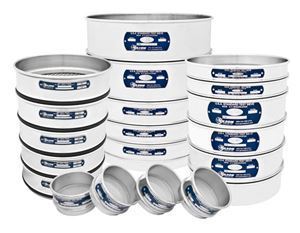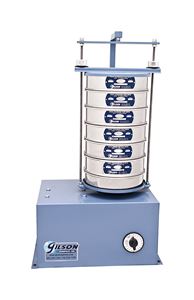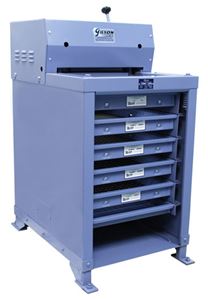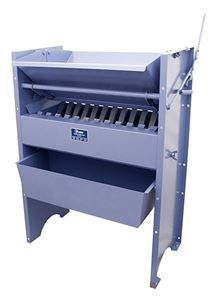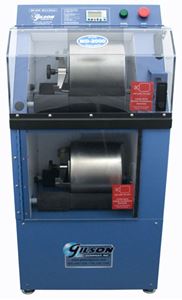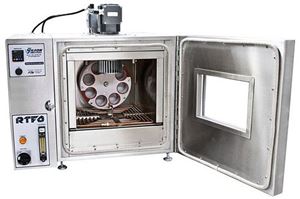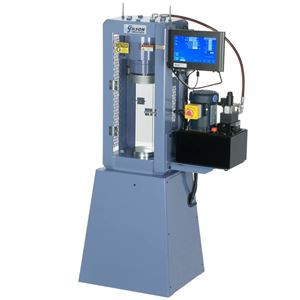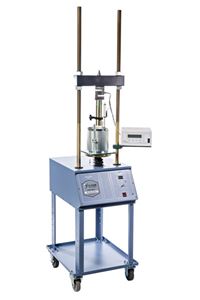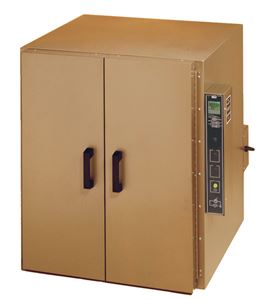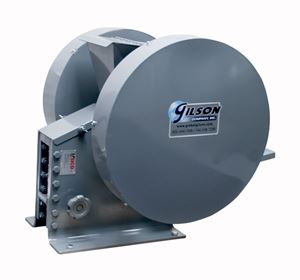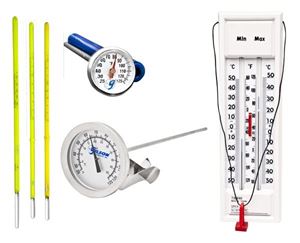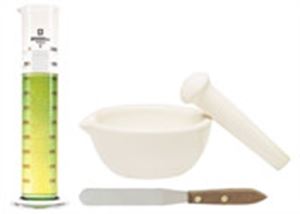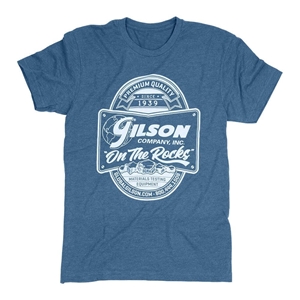
Not every construction materials test or quality control weighing operation can be performed in a laboratory. Some test methods must be performed on the spot to ensure that the best products are being produced or placed following specified procedures. There is always a need for equipment, including portable weighing devices, that operate accurately and conveniently in remote locations.
In this previous Gilson Blog article, we explored the characteristics of all scales and balances and how to find the best one for your application. Portable field scales are a subset of this product line, and in this blog post, we’ll discuss what to look for when choosing one.
Applications for Portable Field Scales
There are countless applications for portable field scales across construction, manufacturing, agricultural, and other industries. Performing essential field tests, using quality control checkpoints in manufacturing facilities, or remote weighing of bulk field samples are all functions that require accurate and dependable portable scales.
For construction materials testing laboratories with active field operations, Reliable portable field scales are an essential part of the field kit for mobile technicians for performing routine field tests:
- ASTM C29/AASHTO T 19 bulk density (unit weight) of aggregates,
- ASTM C138/AASHTO T 121 concrete unit weight, yield, and gravimetric air content.
- ASTM D1556/AASHTO T 191 soil density tests to check for specified compaction on earthwork projects.
- AASHTO T 272 rapid one-point moisture/density (Proctor) tests in the field to confirm Proctor values from the lab.
What are the Differences Between Scales and Balances?
Manufacturers and users alike often use the terms scale and balance interchangeably. In a purely technical sense, there are fundamental differences between the two units. Balances measure mass, the amount of matter in an object. Scales measure the amount of force from gravity acting on the mass. Calibrating a scale at a given location effectively cancels out the effect of gravity and allows the force measurements to be expressed in units of mass like pounds or kilograms.
Confused? Don’t be. The definition may be broad, but traditionally, balances have been more sophisticated for the precise weighing of smaller masses. Scales used simpler mechanisms with less sensitivity, but feature a higher capacity for heavier objects.
Nowadays, however, the lines have been blurred by advances in weighing sensors that are more sensitive and accurate than ever. Modern electronic circuitry extracts greater range, accuracy, and sensitivity from the sensors. From a practical standpoint, there are few differences between the two classes of devices. The most important factor when selecting any weighing device is that it offers the capacity, sensitivity (readability), and accuracy requirements specified in the test method.
Digital or Mechanical?
There was a time when digital scales were much too delicate and vulnerable to shock and dust for field use, and battery operation, when available, was too limited for sustained use. A mechanical scale was the only practical option if you had a weighing application outside a laboratory setting. Fortunately, today’s rugged electronic balances stand up to shock, dust, moisture, and other harsh conditions. Advanced circuitry and modern battery design ensure a stable power supply for plenty of operating time and easy replacement or fast recharging.

Still, some prefer traditional mechanical scales for use in remote locations. These units are simple, rugged, and do not require a power supply. On the downside, be prepared to sacrifice speed, accuracy, resolution, weight, and convenience compared to digital models. Weighing units of measure are limited to one or sometimes two units. An added surprise is that reliable mechanical field scales are typically more expensive than many electronic digital scales. Gilson offers mechanical scales as part of our complete range of weighing products, but we recommend electronic digital models for accuracy, reliability, and convenience.
Capacity, Accuracy, and Readability
When purchasing a field scale, the first consideration is capacity. You’ll need plenty of capacity to meet unanticipated variations in the field, but not so much that the portability of the scale is affected. Excess capacity may also mean a reduction in sensitivity, readability, and a higher price tag. Conversely, cutting capacity too close means increased wear and tear on a lighter-duty mechanism.
The optimum scale capacity is from 1-1/2 to 2 times the anticipated maximum weight of a test sample, including the tare weight of its container. For example, if a ¼ cubic foot (7.1L) unit weight bucket full of concrete has a total mass of around 45lb (20.4kg), a scale with a capacity of about 70lb to 100lb (32kg to 45kg) would be a good choice.
Readability is the smallest division of mass that can be displayed. The scale must meet the minimum requirement. The readability and accuracy required for field weighing applications are usually not demanding. Digital or mechanical scales with readability to 1.0g (0.002lb) or finer and accuracy meeting ASTM D4753 standards are widely available and adequate for most applications.
Exceeding the requirements of the test specifications by a wide margin is unnecessary and costly, and can make the device too “fussy” for field applications. Weighing a sample outdoors on a breezy day is challenging; doing so on a high-sensitivity balance is an exercise in frustration.
Portability
Any mechanical or digital portable scale should be transported and stored in a sturdy case with fitted compartments for the weighing device and accessories. The case protects the scale components from shock, dust, and moisture, and ensures that all accessories are kept together in a “grab and go” container for efficient use.
Platform
The Platform size is a feature you don’t want to forget when choosing a field scale. The platform must be large enough to accommodate all types of large sample containers and sample scoops and ensure there are no interferences during operation.
Digital Field Scales
While many digital scales can be adapted for use in remote locations with available battery power and optional case, we recommend our Compact Field Scales and Ohaus Field Scales.

Gilson’s Compact Digital Field Scales are cost-effective and recommended for most remote weighing applications. They have basic performance and convenience features that enhance their value, but a simple and rugged design keeps the cost down. These models feature battery power and rugged, impact-resistant cases with sturdy handles, hinges, and locking latches. All are lined with dense fitted foam for shock protection.
- Multiple English and metric weighing units of measure comply with test method requirements.
- Data ports output weight data through the interface to a printer.
- Zero and tare functions for convenient operation minimize operator error.
- Choose from conventional or rechargeable battery operation.
- Remote digital displays with backlighting are easy to read in any lighting and allow convenient positioning.
| Capacity | Readability | Data Port | Carrying Case (included) | Brand | Model Number |
|---|---|---|---|---|---|
| 6kg/13lb | 0.002kg/0.005lb | ✓ | ✓ | Adam | CP-6 |
| 15kg/33lb | 0.005kg/0.01lb | ✓ | ✓ | Adam | CP-15 |
| 35kg/75lb | 0.01kg/0.02lb | ✓ | ✓ | Adam | CP-35 |
| 68kg/150lb | 0.02kg/0.05lb | ✓ | ✓ | Ohaus | OB-168 |
| 75kg/165lb | 0.02kg/0.05lb | ✓ | ✓ | Adam | CP-75 |
| 150kg/330lb | 0.05kg/0.1lb | ✓ | ✓ | Adam | CP-150A |
| 200kg/440lb | 0.05kg/0.1lb | ✓ | ✓ | Adam | CP-200 |
Mechanical Field Scales
Mechanical scales feature rugged construction, simple operation, and no need for a power source. They lack the basic features of digital scales and are often more expensive.

Alternative Weighing Options
But these basic models are not your only choices. Features and functions of advanced scales and balances include data collection and processing, weigh-below operation, and higher sensitivity/readability and accuracy. Many sophisticated units have options for battery operation and adapt for field use by adding a suitable foam-lined carrying case. These select models have advantages for some applications.
- Extended readability specifications to 0.1g (0.0001kg or 0.0002lb) or more.
- Additional weighing units offer greater flexibility.
- Suspended weighing (weigh-below) functions for bulk density-specific gravity determinations.
- Two-way data interface ports allow extended communication with printers and PCs for data collection, transmission, and computer control. Weight values can be integrated into spreadsheets and reports.
- Selectable or programmable functions for cumulative weighing, percentages, and data collection for documentation enhance operation.
- Optional carrying cases from the manufacturer or after-market sources offer protection and storage alternatives.
- Optional Weight Sets convert models between metric and imperial weighing units
| Capacity | Readability | Weighing Method | Brand | Model Number |
|---|---|---|---|---|
| 36lb | 0.01lb | Hanging weights and graduated beam | Ohaus | OB-2400P |
| 16kg | 5g | Hanging weights and graduated beam | Ohaus | OB-2400M |
Digital Scales That Adapt for Field Use
The chart below recommends digital lab scales or balances with advanced features and options that adapt easily for portable use. Most models shown are also available in additional capacities and readabilities. Be sure to visit our website to see our comprehensive selection of scales and balances.
| Capacity | Readability | Data Port | Weigh-Below | Battery Operation | Brand | Model Number |
|---|---|---|---|---|---|---|
| 16kg/35lb | 0.0001kg/0.0002lb | Single | Optional | Standard | Adam | CP-25 |
| 22kg/48lb | 0.0001kg/0.0005lb | Multiple | Optional | Optional | A & D | AD-22KA |
| 24kg/52lb | 0.0001kg/0.0005lb | Multiple | Standard | Optional | Ohaus | OBX-524 |
| 25kg/50lb | 0.001kg/0.002lb | Single | N/A | Optional | Ohaus | OB-752 |
| 30kg/68lb | 0.002kg/0.005lb | Optional | N/A | Standard | A & D | AD-60PA |
| 32kg/70lb | 0.0001kg/0.0005lb | Multiple | Optional | Optional | A & D | AD-32KA |
| 32kg/70lb | 0.001kg/0.002lb | Single | Optional | Standard | A & D | CP-26 |
| 35kg/77lb | 0.0001kg/0.0005lb | Multiple | Standard | Optional | Ohaus | OBX-535 |
| 35kg/77lb | 0.0005kg/0.001lb | Multiple | Standard | Optional | Ohaus | OB-135 |
| 35kg/77lb | 0.0001kg/0.0002lb | Multiple | Standard | Optional | Ohaus | OB-135H |
| 42kg/92lb | 0.0005kg/0.002lb | Multiple | Optional | Optional | A & D | AD-42KA |
| 48kg/106lb | 0.0005kg/0.001lb | Single | Optional | Standard | Adam | CP-29 |
| 50kg/110lb | 0.002kg/0.005lb | Single | N/A | Optional | Ohaus | OB-754 |
| 60kg/150lb | 0.005kg/0.01lb | Optional | N/A | Standard | A & D | AD-150PA |

We hope this article has helped you decide on your next portable field scale.
Gilson Is Here to Help
Contact our testing experts for more information or to discuss your testing application.
Testing Resources
Standard Test Methods, Specifications, and Practices
Individual test methods and specifications referenced in our product descriptions, blog articles, and videos are available for review or purchase from the professional organizations noted.
- ASTM International (American Society for Testing and Materials)
- AASHTO (American Association of State Highway and Transportation Officials)
- ACI (American Concrete Institute)
- State DOTs (Departments of Transportation)
- ISO (International Organization for Standardization)
- BS (British Standards)
- EN (European Standards)


